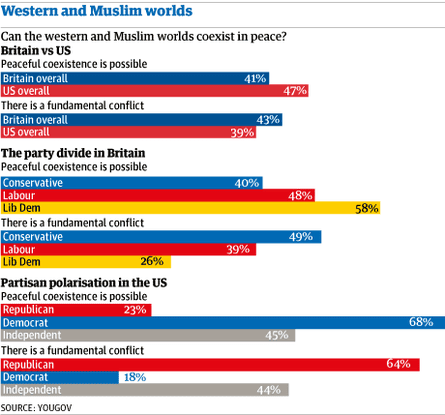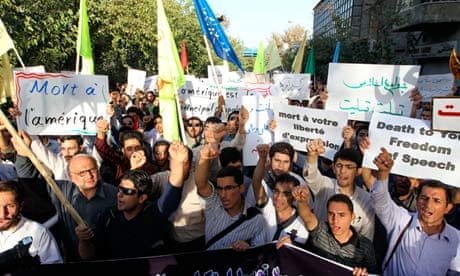An overwhelming majority of Republican voters in the United States regard the west and Islam as being embroiled in "a fundamental conflict which only one side can win", according to new YouGov-Cambridge polling seen exclusively by the Guardian.
As the UN general assembly was convening in New York, with an agenda including the ongoing conflict in Syria, the Iranian nuclear question and the Arab uprisings, the pollsters asked both American and British voters about their attitudes to the Muslim world.
Opinion was reasonably evenly split on both sides of the Atlantic, and indeed somewhat more tolerant in the United States. Overall, Americans rejected the view of a fundamental clash of cultures that can only have one winner – only 39% adopted this view, against 47% who believe that "it is possible for the west and Muslims to coexist in peace". In Britain, by contrast, the respective figures were 43% and 41%, suggesting that British opinion towards Islam is somewhat more hostile overall.
But American opinion is beset by a sharp partisan divide. By a near three-to-one margin, of 64% to 23%, Republicans perceive a fundamental conflict. The overall picture of American tolerance emerges only because Democratic identifiers incline even more emphatically towards the hope of peaceful co-existence, by a 68%-18% margin. The partisan gap in support for the "conflict" view is therefore 46 percentage points. Among independents, the split is right down the middle – with 45% believing peace should be possible, and 44% ruling it out.
There is something of a right-left split in the UK too, but it is nothing like as marked. Amongst Conservatives, there is a 49%-40% lead for the perception of conflict, a near mirror image of the 48%-39% balance in favour of peaceful co-existence among Labour supporters.
That makes the Tory-Labour gap in support for the "conflict" perspective 10 points. Liberal Democrats are the most optimistic about east-west relations, with 58% believing peace should be possible, against just 26% who say the reverse.
The powerful picture of partisan division in the United States is also evident when YouGov-Cambridge asked respondents whether they felt that most Muslims backed the recent wave of anti-American violent protest that swept several countries after an anti-Islamic film made in the US became available on YouTube. The overall balance of opinion in both Britain and America was very similar, with 34% of Britons and 37% of Americans believing the violence had the support of half or more Muslims, against 55% of Britons and 53% of Americans who believed that it only had minority support.
Once again, however, when Republicans were singled out the balance changed: by 59% to 34% they believed that the violent attacks enjoyed majority backing among Muslims. Democrats take the opposite view, by a margin of 68%-18%. British voters are, once again, less sharply divided on partisan lines. Respective proportions of 41%, 34% and 23% of Conservative, Labour and Liberal Democrat voters believe that the rioting enjoyed majority support. And among voters of all three stripes most believe that the violence rested on only minority support.
Britons and Americans alike are feeling disinclined to provide aid to foster democracy in the wake of the Arab spring. In Britain, 69% rejected the suggestion of giving aid, as did a majority of each party's voters. In the US, the idea of aid is rejected by a slightly smaller overall majority of 58%, although once again the strong partisan divide comes to the fore. Some 81% of Republicans reject the idea of giving aid, but only 36% of Democrats feel the same way.

For the British element of the fieldwork, YouGov-Cambridge interviewed 1,739 British adults online. Fieldwork was undertaken between 23 and 24 September 2012. The figures have been weighted and are representative of all GB adults (aged 18+). YouGov is a member of the British polling council, and complies with its rules. In the US, 1,000 adults were interviewed between 22 and 24 September.
